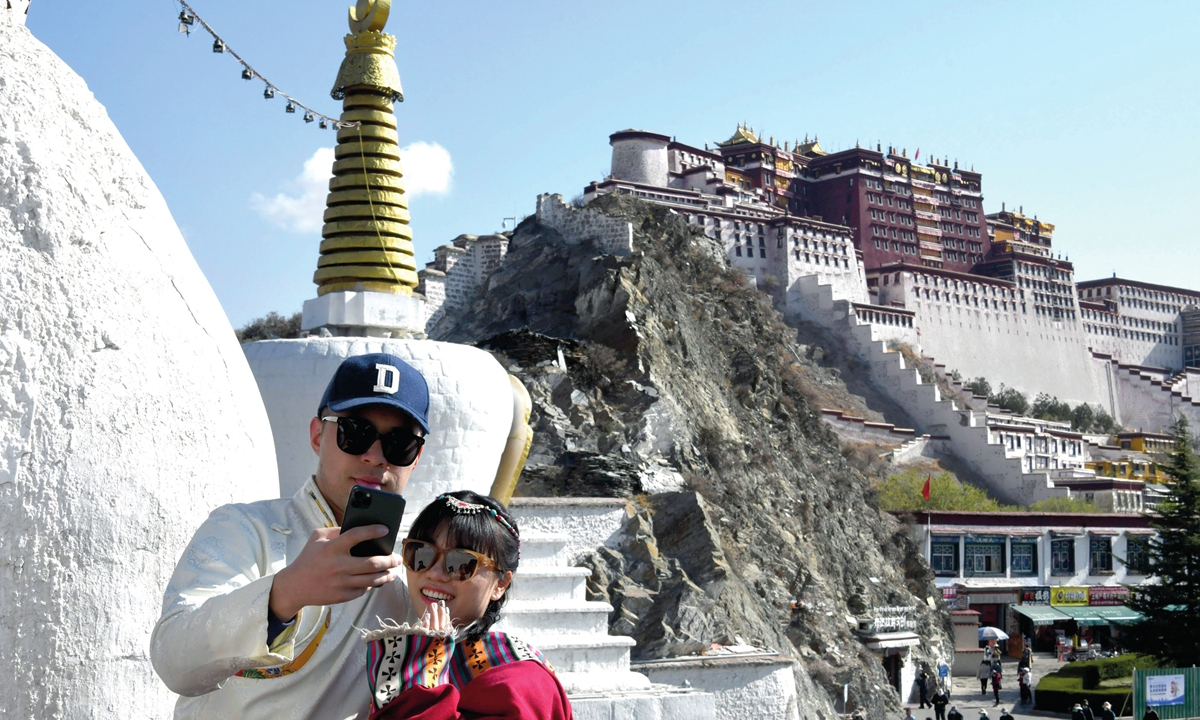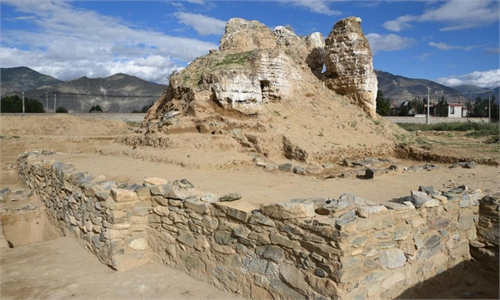What I see first-hand in Xizang: The region is flourishing with ecological and economic development

Tourists dressed in ethnic clothing take pictures in front of the Potala Palace in Lhasa, Southwest China's Xizang Autonomous Region on April 17, 2023. Photo: VCG
When one walks or drives around Lhasa, the capital of the Xizang Autonomous Region in China, one notices a unique phenomenon. Teams of workers are on the slopes of the mountains to the north and south of the river valley in which Lhasa is located. And what are they doing? Planting and watering trees.For the reader, this may not seem like a remarkable activity, so let me add a few facts. Lhasa city has an elevation of 3,646 meters above sea level. The oxygen in the air is 40-45 percent less than what you experience at sea level. Only certain plants and trees can grow at such an elevation. Further, the mountains around Lhasa, which rise to over 4,000 meters above sea level, have historically been bare of vegetation, apart from a few grasses.
Now it should be clear why this is such a unique activity: These workers are engaged in the afforestation of the mountains around Lhasa city. In a discussion with a local government official, I was told that the plan is to have the mountains covered in trees in 10 years' time. This is merely one example among many of the greening of Xizang, of what is also known as ecological civilization.
Perhaps it is time for some background. In May of 2023, I was invited by the State Council Information Office of China to join an in-depth research field trip to the Xizang Autonomous Region. For a week, we had an incredibly busy schedule, walking up to 10 kilometers per day. We visited poverty alleviation projects, new enterprises, schools, Tibet University, ecological projects, Buddhist temples, traditional Xizang opera and folk music performances, and much more. On quite a number of occasions, I was able to talk with local people about history, culture, life today, and aspirations. Out of these many experiences, three stand out.
The first is Xizang's stunning economic development. Everywhere I turned was evidence of Xizang's economic growth: new and upgraded roads and railway lines; modern building projects reflecting Xizang's architectural style; electricity, telephony, and communications networks; enterprises making the most of opportunities and government start-up funds; and the sheer innovation in a challenging environment. A small example: On our second last day, we climbed up to a mountain pass at about 5,000 meters above sea level. I pulled out my phone and found that the signal was as strong as it was in Lhasa. To be clear, this economic development is not for the few, but for the benefits of all of Xizang's people, all of Xizang's nationalities.
The second is the effect of the economic development. Poverty alleviation is an obvious effect. By the end of 2020, Xizang was able to overcome absolute poverty in all regions. This was no small task, since Xizang has some of the remotest and harshest conditions for human existence in the world.
Another effect is the flourishing of culture and education. We witnessed first-hand the fostering of Xizang's unique high-altitude traditional medicine, the careful attention to preserving its classic texts, the teaching of children in the local language, and the teaching of traditional musical instruments and calligraphy. We visited one of the most sacred sites in all of Xizang, the Jokhang Temple. Under state protection and managed by about 30 Buddhist monks, it was thronging with people free to express the way they felt about being there. As for education, we visited a primary school, a high school, and the Tibet University in Lhasa. The quality of the teachers, equipment, and innovative teaching methods was obvious.
Some would argue that modernization is a challenge to traditional culture, that people's attitudes change in light of modernization. I would argue that the relationship is more complex and even dialectical. Culture relies on the strength of the economic base. When the economy is growing and is strong, culture and education can flourish and innovate. Conversely, the increase in an educated and cultured work force means that the economy can strengthen even more. Further, while there is always a strong sediment in culture, providing the worldview and assumptions of the people, each generation contributes in a creative fashion to reshaping the culture that they inherit and then hand on to the next generation. In other words, in light of Xizang's incredible economic development, the culture of Xizang is flourishing as never before. Indeed, Xizang's own culture is a significant contributor to what we know as China's fine traditional culture as a whole.
The third strong impression concerns ecological projects and thus ecological civilization. Looking out of the window as we drove through the countryside and wound our way up to mountain passes, walking many kilometers every day, and visiting ecological projects, I gained a very strong impression of the creative and world-first efforts at high-altitude ecological preservation and "greening." I am wary of using terms such as stunning, extraordinary, and exemplary, but these are appropriate to the ecological civilization projects in one of the most unique environments in the world. In fact, I am already planning my next research visit to Xizang to examine these projects in more depth.
To conclude: There is a well-known four-character saying that comes out of China's long tradition - what one sees and what one hears. In other words, the only way to know the truth is to see first-hand, to speak with local people, to examine and verify. This is what we did in Xizang. And in doing so, we were able to find truth from facts.
The author is a Marxist scholar from Australia, overseas talent professor in the School of Philosophy at Renmin University of China, and on the editorial board of the Australian Marxist Review. opinion@globaltimes.com.cn

